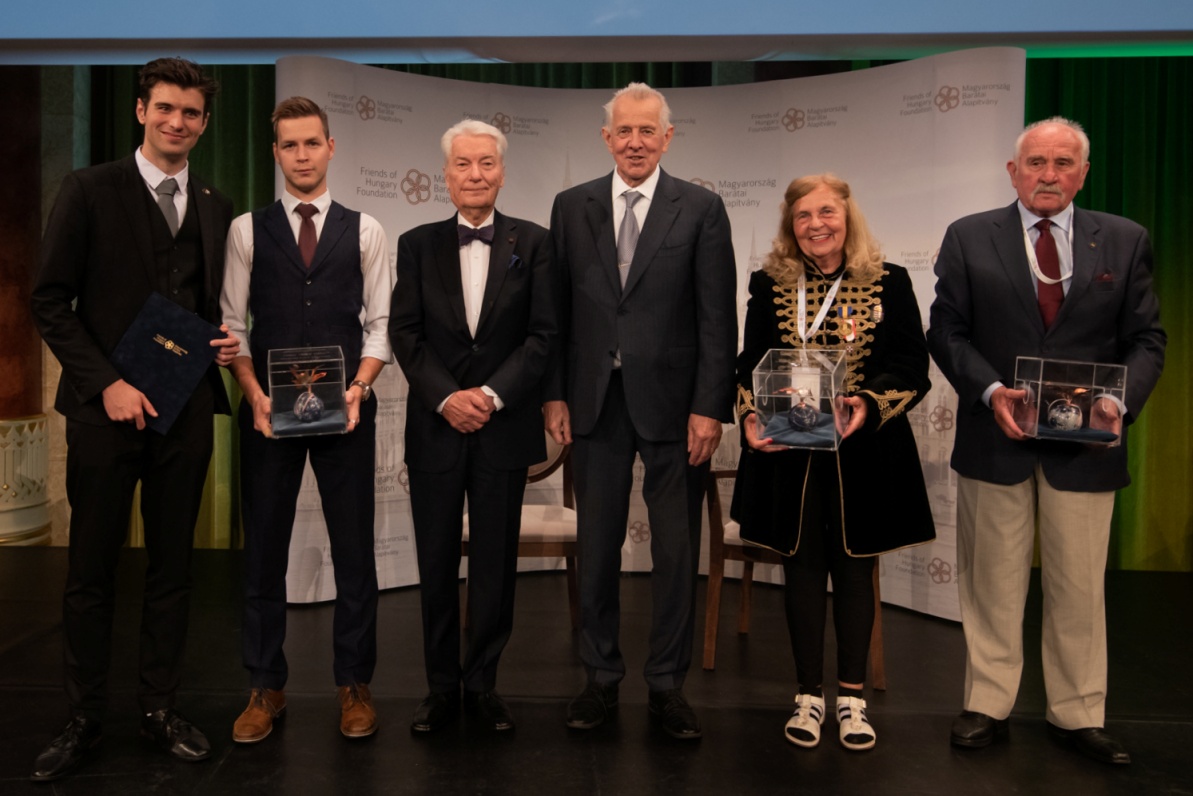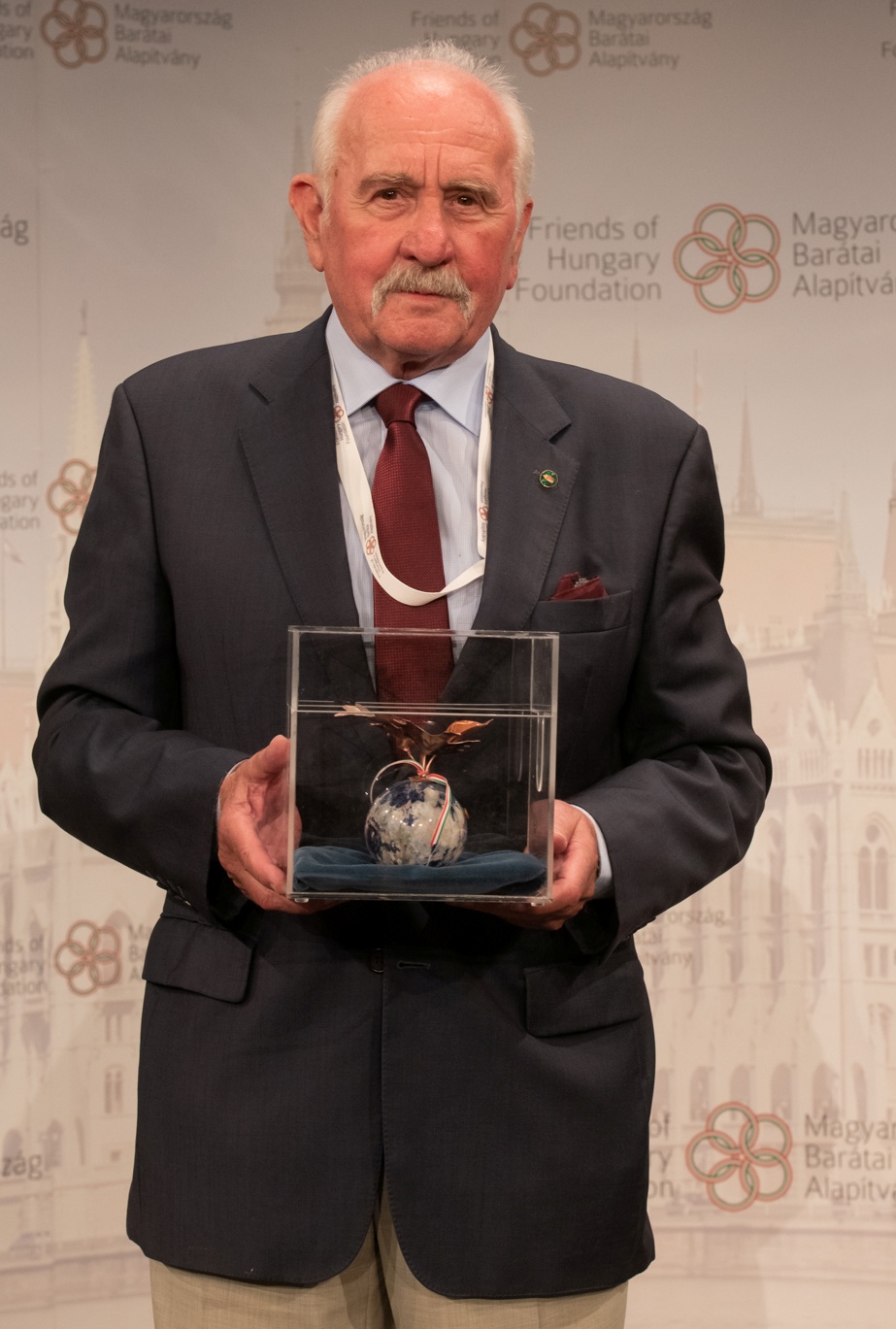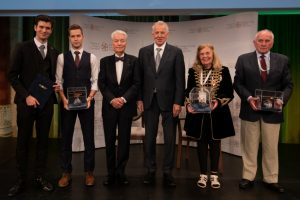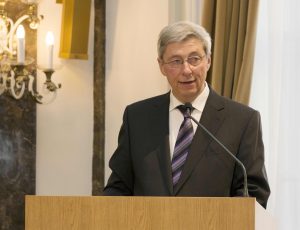
The prize is awarded annually to members of the Hungarian global diaspora or to those working to enhance Hungary's reputation.Continue reading

A forestry engineer who became champion of the rights of Hungarian minorities in front of the UN and the European Institutions, József Komlóssy, has been awarded the Friend of Hungary prize for his outstanding contribution by the Friends of Hungary Foundation, publishers of Hungary Today.
József Komlóssy was born on March 9, 1936. After his primary school education he graduated from the Forestry Technical School in Debrecen. From 1954, he started his higher education at the Forest Engineering College in Sopron. Here he heard about the 1956 anti-communist revolution and became an active participant. After the subsequent Soviet occupation, he fled to Canada. In 1962, he moved to Switzerland, where he worked as a civil engineer. In 1996, he closed down his design office to devote all his time to his most important goal in life: to serve the Hungarian people.
From the mid-1980s onwards, he became increasingly active in international minority protection issues. He was instrumental in the UN Human Rights Committee’s condemnation of Romania for its village demolitions, and as secretary of the International Transylvanian Committee he organized aid shipments from Western Europe to Transylvania and Moldova after the fall of the Ceauşescu regime.
In 2004, he was awarded the Knight’s Cross of the Order of Merit of the Republic of Hungary by the Hungarian government, and in 2016, he was awarded the Order of Merit of the Order of Merit of Hungary, Civilian category.
You have received this year’s Friends of Hungary Award. For which of your past achievements did our foundation award you the prize, do you think?
It is difficult for me to judge, because my goal was to serve my country and the global Hungarian community. The Lord God gave me the opportunity to do this in international forums. I spoke at the UN in plenary session for 13 years. Two of them were on the Csángó community’s issues. My motto was that I was not speaking against someone, but for someone who could not be here to tell you about their suffering. That was a very important thing. The other thing is the Council of Europe. I have not missed a single parliamentary assembly in 23 years at the Council of Europe. Here, too, I served Hungarians. In all this I would not have been able to fulfill all my objectives if I had not been able to rise above party politics. Hence I had excellent friends among the Socialists, such as Csaba Tabajdi, former member of the European Parliament, who was first and foremost a Hungarian, and then a Socialist. He too, put the interests of Hungarians first, and he never questioned my political orientation. We served one purpose. And I said to him: “we can wear different glasses with which we look at the world, but the most important thing is that our common goal should be to serve.”
Many have worked for the Hungarian people in the last decades, incessantly, to defend our reputation and our interests. Now you look beyond Hungary’s borders and see so much hate, prejudice, criticism… Do not you feel that your work was not successful?
It has not been wasted, because God gave me the opportunity, at a time after 1989, when our relationship with the West was in its ascendant stage and we were rushing to the barricade with unconscious idealism, to achieve results. We achieved a result with the Framework Convention for the Protection of National Minorities, with the charter for local government, or with the result when we listed the obligations that Romania, Slovakia, and Ukraine had to fulfill in order to become a member of the Council of Europe. That was all in order. I am not a religious zealot, but I am convinced that the Lord God has been with me and has given me friends. Yes, we have achieved this together.
You say that you have achieved it, but why does the Council of Europe not enforce the rights for Hungarians that these countries – we are talking about Romania, Slovakia, and Ukraine – have signed up to and committed themselves to?
The question is an extremely good one and it is one of my pet peeves that any law or agreement is only worth what we collect from it. And a specific case: when the Ion Iliescu government was dissolved in Romania and there was talk of being gentle with Romania on minority rights, I was of the opinion that no, we agreed to this, ‘was abgemacht, ist abgemacht’ (what is done is done). Now, I do not want to be pretentious, but please, there are a few people besides the Lord God who know how many of Slovakia’s admission requirements I have formulated. And: what was the result? That under Prime Minister Vladimír Meciar I was declared a persona non grata in Slovakia. Now I will say something very important: If the agreements that the Council of Europe has concluded with neighboring countries had been implemented, we Hungarians would have half as many problems in the European Union.

Photo: Hungary Today
But in spite of this, European organizations are accusing us Hungarians of not fulfilling our own obligations…
We Hungarians can be called many things, and unfortunately rightly so, but: I learned in my time exactly that as a diplomat you can conceal things, but you must not lie. And in 23 years I have never known us to lie in Strasbourg. We do not lie. The other side, I will not name the country, they say: well, by the time it turns out that we have lied, it is too late anyway. Unfortunately, history has proved them right, not us.
And what is the lesson for us? Should we start lying too, to achieve our historical goals? How can they be achieved with sticking to truth only?
No, by no means should we lie. What is important is that we must win over the people around us. The most important thing is for me to remain a credible person.
But you know very well that the problem in the surrounding countries is not that they do not believe what we say or would deny that we have the right to say it. But there are certain interests that can buy their opinions and their votes. We cannot compete with that…
There are people today who cannot be bought. I can say that I was also incredibly lucky, because I won over a man like Reinhard Olt, Frankfurter Allgemeine Zeitung journalist and historian, for the Hungarian nation, who is still standing by us. I was the one who took him down to the Romanian Csíksomlyó Baptism in 1993. And as a result of his conversation with the Csángó there, he wrote three articles about the Csángó. That was the first time in the twentieth century that the issue of the Csángó people was raised in Europe.

Photo: Tamás Lénárd/Hungary Today
The Moldavian Tschangos, living on the easternmost edge of the Hungarian-speaking area, struggle to survive in a stifling climate, in the absence of Hungarian schools and Hungarian priests. Because of the compulsion to assimilate, tens of thousands of Hungarians grow up feeling ashamed of their minority status and therefore having to deny their mother tongue, culture, and identity.
You were an integral part of our Friends of Hungary Foundation for years: what can we, as a foundation that keeps in touch with the Hungarian diaspora in the world, do to mobilize them to tip the balance of world opinion in our favor? What can we do in concrete terms?
We should dare to be Hungarians, to act on behalf of Hungarians. And never, I learned this from Miklós Bánffy (former foreign minister), never lie. If I want to represent a Hungarian cause at an international level, then the first task for me is how I can cover it with an international “sauce” so that it does not appear to be a Hungarian cause. So I need to know the legal conditions that I can use to unwind this, so that the Hungarian baton does not hang out so much and I have to sell it with this “sauce,” i.e. as a common cause.
As far as young people today, a political identity has emerged today that appears to be stronger than national identity. How can we return our young people to the understanding that national identity is where they can build the most secure future for themselves and their families?
I have lived most of my life in Switzerland, which is a confederative state, where all the cantons are states within the state, and even the communes within the state, and where there is a real local identity. This is what Bolshevism wiped out in Hungary. This must be brought back.
It is much more attractive, this global identity, this is what young people are hungry for. Why is local better?
Here we live within the Carpathian Basin: we belong to different regional dialects, but we are all Hungarians. So we have to have a local identity and we have to combine it into a universal identity.
There is a competing cultural “economy of scale” though. This is the psychology of young people, that with a global identity I am part of something much bigger, which is more attractive and where I can choose my values and causes that really suit me. Whereas in a small regional identity, one is limited.
If my brother achieves something, that is more important to me than anyone else’s merit. If you are a villager, local ties are more important to you than national ones. In international sporting competitions, it is not a competition between individual athletes, but between nations. But here is a thought that might inspire our younger generations to understand all the above:
‘You can do a lot for your country, but you can never do enough for your country.’
Featured Image: Friends of Hungary Foundation